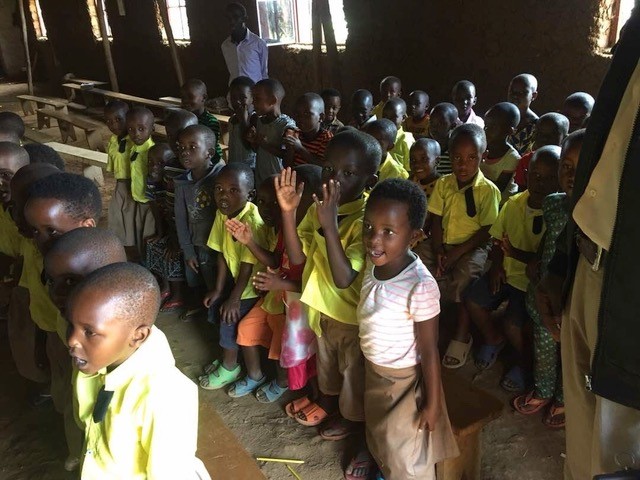
Have we over-regulated our Early Childhood programs? Lessons I may have learned during my travels through Rwanda… Or maybe I am just longing for the good old days of play with more risk and where supervision was not defined as never allowing children to problem solve their way out of challenging situations and navigating natural environments…
I had an opportunity to visit several “ECD” programs in their remote villages as well as one in a Congolese refugee camp. Even though each was in a setting uniquely its own there were many common denominators: mud/stick/straw construction with mud/clay floors, sparse classrooms with no manipulatives or furnishings that we would recognize as early childhood appropriate, 2-4 hand-drawn posters of fruit labeled in English, the English alphabet and the numerals 1-10 accompanied by sight words one through ten, a chalkboard with the lesson of the day… and children, very happy children highly engaged with equally happy teachers both women and men…
The topography of the mud/clay floors in each classroom was defined by whoever and whatever had been walked or dragged across them after the most recent rain… deeply rutted, cratered, multi-leveled… packed to the hardness of concrete… not a single level surface for the many child sized chairs set up in two groups of rows facing each other.
Getting to the classrooms meant crossing, at the beginning of the rainy season, water filled ruts, irregularly pitched muddy pathways with goats and chickens serving as sentinels in every cleared area and groups of people of every age riding bikes, walking alone or in small clusters carrying bundles (but seemingly unburdened), the children not appearing to be attached to any particular adult but intently making their way either to or from the classroom.
Bathrooms quite far from the classrooms that children went to and came from at will then heading to a makeshift washing station before re-entering the classroom.
Many, many children hovering on the perimeter of the classrooms often ducking into the tropical environs when looked at… children without the ten dollars a month required to attend the ECD program.
 …And in the refugee camp… children taking their noon break, walking several kilometers up a steep incline with a cliff on one side and a deep gully on the other on a dirt road that was barely a single lane with cars and trucks driving at reckless speeds through the throngs of walking, running, playing children… often with no more than an inch or two separating the vehicles from the children… it was as though the vehicles were driving at full speed through a busy playground…
…And in the refugee camp… children taking their noon break, walking several kilometers up a steep incline with a cliff on one side and a deep gully on the other on a dirt road that was barely a single lane with cars and trucks driving at reckless speeds through the throngs of walking, running, playing children… often with no more than an inch or two separating the vehicles from the children… it was as though the vehicles were driving at full speed through a busy playground…
And one more thing they all had in common… no evidence of a history of injuries, mishaps or missing children… no incident reports of skinned knees, punches thrown or broken limbs…
Conditions and situations that would result in immediate closure, investigations and charges where I am from were the norm in the programs I visited in Rwanda.
In some measures it all came down to expectations… the adults expected the children to be self sufficient, they expected them to manage and prevail in the situations that defined their everyday lives, children were aware of and had respect for the conditions around them and proved, in all challenges, to be competent enough to avoid mishap and mayhem. In every case, in other words, the children rose to the level of expectation set by the adults in their world.
The supervision and monitoring of the Rwanda programs are in stark contrast to the Early Childhood programs that I have the great fortune to visit here in the United States. I need much more time to unravel the why but I am very curious for now about the what…
What I see here: supervision and monitoring levels in our classrooms and playgrounds rivaling the intensity of a surgical unit or an air control tower with results and outcomes less favorable than in Rwanda. I see head counts conducted at every transition (one classroom I visited recently had 17 transitions in their schedule and they are a half day program!), ‘hand-offs’ (intentional changing of the guard among staff with children’s names being called out as the transfer of supervision is conducted) from one teacher to another in hallways that have multiple corners and entries, ‘hand-offs’ on playgrounds as children transition in and out and as groups mix or a child has to leave for the bathroom, ‘hand-offs’ even inside the classroom as children move through activities particularly hand washing and bathroom breaks, an entire roster of children being sent to and from the bathroom even if only one child has a need to go in an effort to maintain ratios, I see name tags (often in the form of foot prints) on the floor to try to account for each child as they line up while teachers go up and down the line counting heads and calling names, I see alarms on doors that go off so frequently during the day that teachers no longer hear them and the alarms no longer serve any purpose other than to disrupt, I see cones and fencing and safety surfacing and elaborate shading and climbing structures that usually have no relationship with the natural setting but have been determined to be developmentally appropriate, I see cameras monitoring classrooms, supervisors monitoring cameras, paperwork designed to prove accountability but which seems to serve as distraction from teachers’ real passions and infringe on their creative times with children and each other, I see policy manuals that may have started out as appropriate but over time have become filled with redundancies and contradictions (at a program I visited I watched teachers struggle to navigate conflicting policies like: they were required to turn in a hand written meal count by 9:15am but another policy forbid them from doing any paperwork while children were present), I see less and less job satisfaction and more and more turn-over…
I see, and this is where the head scratching starts, binders filled with accident and incident reports, children being found in unsupervised situations with no clue how to mange themselves out of their predicament and staff in a frenzy once its discovered that a child is ‘missing’, I see supervisors increasing their scrutiny in the classrooms, parents increasing their scrutiny of supervisors and regulatory agencies increasing their scrutiny over everyone! I am finding volumes of research suggesting that over monitoring is actually counter productive and can lead to unwanted outcomes… more about this as I learn more.
…More to follow…


Desired Outcomes determine quality and quantity of supervision. Defining what that quality means is what you are all about. I’m glad you are in the trenches my friend.